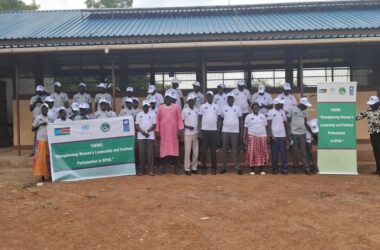By Philip Buda Ladu
Transitional National Legislative Assembly (TNLA) has passed a crucial Anti-Money Laundering and Counter Financing of Terrorism Act 2012 (Amendment Bill 2024) from its second to third reading and final stages.
The bill, which is an international treaty, requires domestication, and once ratified, South Sudan would adopt a serious crime, increase controlling measures, and merge with it domestic laws such as the Penal Code, Penal Procedure Act, and Anti-Corruption Act, among others.
In early July 2024, the Minister of Justice and Constitutional Affairs, Justice Ruben Madol, tabled this critical amendment bill before the national parliament for further scrutiny by the lawmakers.
After Madol’s presentation, House Speaker Juma Nunu Kumba referred the bill to the relevant specialized committees, including the Foreign Affairs, National Security and Public Order, Legislation and Justice, and Finance Committees.
Nunu directed the committees to review the treaty and report back to the parliament within fourteen days.
In conformity with provisions of TNLA Conduct of Business Regulations 2011 (Amended 2021) the Committees reviewed and examined the general principles of the Bill and made references to the R-ARCSS, 2018, the Transitional Constitution of the Republic of South Sudan. 2011 (as amended) and made comparisons to other related legislations from East African Countries to benefit from their practices.
Kom Kom Geng Atem, Chairperson of the Standing Specialized Committee of National Security and Public Order, presented the joint report of the committees to the August House in its second reading stage for deliberation during Monday’s assembly session.
After scrutiny, the committees concluded that the bill is consistent with the Transitional Constitution of the Republic of South Sudan, 2011, (as amended); the bill is well-matched with the Revitalized Agreement on the Resolution of the Conflict in the Republic of South Sudan, 2018.
The Bill is compatible with or related to other legislation in the region, and the provisions of the Bill are not in conflict with any other existing laws of the Republic of South Sudan and are comprehensive.
During his presentation of the committee report, Kom highlighted some concerns regarding this bill.
He underscored that first, South Sudan is a member of the Eastern and Southern Anti-Money Laundering Group, which is the Financial Action Task Force (FATF).
This regional body is required to adhere to FATF 40 recommendations, which, among others, require countries to combat money laundering, terrorism financing, and the proliferation of weapons of mass destruction.
Furthermore, South Sudan is being monitored and has been placed on the FATF Grey List. To avoid being blacklisted, South Sudan has to adhere to and align this amendment bill with FATF 40 recommendations before September 2024.
Kom echoed that failure of South Sudan to ratify the amendment bill before September 2024 means that the country will not be able to sell its crude oil in the international market, investors will not invest in South Sudan, and South Sudan will not access any loans, among other measures.
“In light of the above, I hereby humbly request the august House to deliberate and pass this report of the Joint Committees on the “Anti-Money Laundering and Counter Financing Terrorism Act, 2012 (Amendment) Bill, 2024″ by suspending Regulation 106 of the TNLA, Conduct of Business Regulations 2011 (Amended 2021), and invoking Regulation 100 to take the Bill through all the remaining stages in one day.” Kom submitted.
Speaker Nunu opened the floor for debate on the general principles of the amendment bills in the second reading stage, where lawmakers made their critical submissions, and the bill was passed to its third reading stage.
In the third reading stage, the speaker also subjected the bill to a sustentative deliberation by the house, in which members were urged to point out their observations on specific areas in the chapters of the bill that necessarily needed an amendment or adjustment to a clause.
After the thorough deliberation of the bill by the house from the second to the third and final reading stage, the Anti-Money Laundering and Counter Financing of Terrorism Act 2012, Amendment 2024, was unanimously passed by the house with all its observations and recommendations, chapter by chapter.



